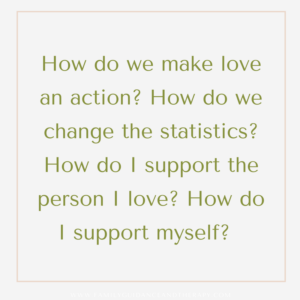It’s absolutely terrifying and deeply heartbreaking when a 6 year old comes into your office and talks about not wanting to ‘be around’ anymore.“I want to go to sleep and never get up.”
“I just want to go to the bottom of the pool and stay there.”
“I’d be better off dead.”
Suicide is the second leading cause of death for those between 10 and 24 in the general population. Each day in our nation, there are an average of over 5,240 attempts by young people grades 7-12. Suicide is the 10th leading cause of death in the US.
The suicide rate in autism is 40% higher than general population.
While we would all love to talk about love forever, another way of loving people is recognizing and supporting needs. Whether it is the tendency to perseverate on topics or get ‘stuck’ in a line of thinking, many people with autism struggle with suicidal ideations throughout their life, starting at a young age. Many silently enduring their pain, not knowing, wanting, ready, or able to give that pain a voice.
This here is a big need. A burden that nobody should carry alone. Nothing is more worthy of our love.
But how do we make love an action? How do we change the statistics? How do I support the person I love? How do I support myself?
“There is no one giant step that does it. It’s a lot of little steps.” –unknown
This quote can be either frustrating or inspiring. Frustrating because there is not an easy fix, no magic remedy. Inspiring because every effort, every action is meaningful and valuable. The journey from suicidal ideation and depression to wellness is arduous. Start with education. Learn about it. Recognize the signs. Take action and get support.
Here are 13 lessons on suicide in the autism community.
1) It happens more than you think. Between 10 to 66% of individuals with autism report having thought of taking their life, suicidal ideations, at some point in their life. Between 10-33% report attempting suicide at some point in their life. A huge mental health issue that those with autism are silently struggling with. Individuals on the autism spectrum are 40% more likely to commit suicide then the general population.
2) It might look and sound a little different. Many times the comments indicating suicidal ideations are a little vague. These comments can be especially vague and confusing if you didn’t recognize or the person hasn’t expressed feeling depressed.
3) It doesn’t make you a bad person if you’ve thought about it. It also doesn’t make you a bad parent if your child has had suicidal ideations. Suicide happens when people lose hope. That’s it. It’s not a weakness or deficit in character. It doesn’t mean that you’re a horrible person or that you’ve failed. Suicidal ideations and attempts occur because our problems have become so big, feel so overwhelming that it changes the way we view, see and experience the world.
4) You matter. We don’t feel it enough, but it’s true. We all matter to someone. If this doesn’t feel true for you, then find someone to talk to.
5) Talking about your suicidal feelings is a way to give it less power, not more. Many remain silent on these issues, mistakenly believing that if I don’t talk about it, it won’t be as big of a deal. But silence increases it’s power. Silence makes the struggle bigger and harder to deal with. Silence continues the isolation. Silence makes it worse.
6) You are not alone. Many people feeling suicidal are acutely aware of feeling isolated and alone. Realize you are not alone. Find something to connect with, be it family, community, spiritual beliefs, nature, or a qualified professional, take steps to recognize the ways you are connected with others.
7) It’s okay if you can’t manage it alone. You don’t have to, nor should you. Depression has a scary way of clouding judgment and limiting our world view. Depression has a way of clouding the mind to make the bad things glaringly obvious, while the good gets pushed aside. This isn’t a conscious process, but the effects of depression on the brain.
8) Don’t intensify it. Drugs and alcohol don’t mix with depression. In fact, they make it worse.
9) Relationships matter. Loneliness significantly increases depression and decrease self-esteem and life satisfaction.
10) Everyone deserves to be heard. Tell your story. Share what is going on. Often when we think about opening up around a hurt, one of the things we are hesitant about is the pressure to share everything before we are ready. What you share is your choice. Share something. Anything. For those hearing the experience, offer a safe and supportive space free of judgement.
11) Conformity hurts. Labels of ‘not normal’ are pervasive in the autism community. Only treating behaviors, providing ‘rules’ or ‘rigid practices’ to dynamic situations is not only sending the message about the need to conform. These are damaging.
12) Reach out if you are experiencing ideations. Suicide is never the answer. Allow others to share and support you in your journey back to wellness. Call the crisis line at 1-888-724-7240, as a first step.
13) We weren’t designed to handle everything. Our resilience and coping has limits. Sometimes a problem becomes more then we can manage. It happens to everyone, both on and off the spectrum. This is when professional support is needed.
You are not alone. Find community at Love & Autism. Attending our conference or even following us on Facebook can put you in touch with others that understand your struggles and are looking to connect. If you or someone you know is thinking about harming themself, please call the suicide hotline at 1-888-724-7240.

